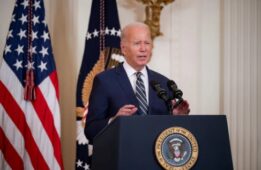'cultural Genocide': How China Is Tearing Uyghur Families Apart In Xinjiang edition.cnn.com
Every day, US-based Uyghur journalist Gulchehra Hoja tries to call her family in the Chinese region of Xinjiang. Sometimes she tries up to 20 different numbers, just hoping that someone will pick up.
"I know they won't pick up the phone, but I try … nobody picks up," she told CNN in an interview from her office in Washington.
She doesn't expect an answer because 23 of her family members — including her aunt, her brothers, her cousins — have disappeared, along with tens of thousands of other ethnic Uyghurs inside enormous state-controlled "re-education camps."
Hoja, who works as a journalist for US government-funded Radio Free Asia (RFA), says her brother was the first in the family to vanish in September 28, 2017.
"This is my brother and this is me," she says, holding up a picture. "This was taken in summer 2000, it's my birthday … this is my last picture with him …. (Now) he is missing. We don't know where he is now."
Uyghur journalist Gulchehra Hoja holds a pictures of her brother who has been missing in Xinjiang for more than a year
Her aunt, who raised her, and then her cousins vanished into Xinjiang's vast detention system, without any explanation or trial. She says her parents, meanwhile, are kept under house arrest, unable even to go to a doctor without permission.
An estimated one million Uyghurs, a predominantly Muslim ethnic minority in western China, are being held in camps across the region, according to a US congressional report.
The Chinese government has never explained the disappearances, which began in 2017, nor said how many people are being held in the camps, which they insist are "vocational training centers" that local "students" are happy to attend.
Defending his country's human rights record at a United Nations forum in early November, China's Vice Minister of Foreign Affairs Le Yucheng said that his country had made "remarkable progress" in the past four decades, including "lifting more than a billion people out of poverty."
But many other countries remain harshly critical of Beijing's record, especially in regards to the Xinjiang camps. More than a dozen states including Australia, Germany and the United States have called on China to dismantle the camps and release those detained.
"They are transformation centers, and they really are aimed at completely altering Uyghur culture and identity. It's kind of a surreal practice, I would say, that is definitely unprecedented in the 21st century," Sean Roberts, director of the International Development Studies Program at George Washington University, told CNN.
Hoja goes even further. She describes it as "cultural genocide."
Beijing has had a long and fractious history with Xinjiang, a massive, nominally autonomous region in the far west of the country that is home to a relatively small population of around 22 million in a nation of 1.4 billion people.
Although the ruling Communist Party says Xinjiang has been part of China "since ancient times," it was only officially named and placed under central government control after being conquered by the Qing Dynasty in the 1800s.
The predominately Muslim Uyghurs, who are ethnically distinct from the country's majority ethnic group, the Han Chinese, form the majority in Xinjiang, where they account for just under half of the total population.
This, however, is changing fast. According to government data, in 1953 Han Chinese accounted for just 6% of Xinjiang's total population of 4.87 million, while Uyghurs made up 75%. By the year 2000 the Han Chinese population had grown to 40%, while Uyghurs had fallen to 45% of the total population of 18.46 million.
Continued economic development has led to an increase in skilled Han Chinese migrants. The provincial capital Urumqi, Xinjiang's largest and most prosperous city, is today majority Han Chinese.
"They named our homeland Xinjiang … Uyghurs prefer to call it East Turkistan because our land was called (that) before the Chinese occupied," Hoja said, looking at the map of her home province. Xinjiang means "new frontier" in Chinese.
In the past decade, perceived "Sinocization" across Xinjiang has led to Uyghur unrest — and bouts of bloody ethnic violence.
The region has also been braced by acts of terrorism, often directed at authorities. In reaction, the provincial government, which blames the terrorist attacks on independence-seeking Uyghur extremists, has greatly expanded its efforts to control the local Uyghur population.
Under direction of Xinjiang's Communist Party Secretary Chen Quanguo, authorities have cracked down hard on the Muslim beliefs and practices of the Uyghur population, including face coverings and long beards, Quran study groups and preventing government employees from fasting for Ramadan.
Anyone can be sent, under the flimsiest of reasons, to "re-education camps," according to Hoja. "When my brother was taken … my Mum asked like, 'Why are you taking my son? What he do?' And the officer answered back, 'His sister's (in the US), is that not enough to take him?'" she said.
But Hoja believes the real reason he was taken was simpler than that. "They are targeted just because they are Uyghurs."
Hoja claims up to 40% of the province's Uyghur population, as many as four million people, could currently be held in the "re-education camps."
"They are ill-treated there. They are tortured there. Even you cannot speak your own language in there, you are brainwashed," Hoja alleged.
"Every day before your meal you have to sing a 'red' (communist) song, and say thank you to (Chinese President) Xi Jinping or the Communist Party."
In defense of the government's policy, Chinese state broadcaster CCTV aired footage inside what they term "vocational training camps," showing smiling Uyghurs learning Chinese and skills such as sewing.
But Hoja challenged the idea that her family was in such desperate need of vocational training that they should be taken to the camps.
"My aunt knows more than three languages, she is also retired from the Xinjiang Museum, so what kind of education does she need to take?" she said.






Leave Your Comment